As new parents or caregivers, you may have noticed that your baby often sleeps with their arms up in the air, almost as if they’re reaching for the sky. While it may seem like an odd position, this particular sleeping posture is not only common but also entirely natural. If you’re wondering why do babies sleep with their arms up, you’re not alone. This behavior has intrigued many parents and caregivers, and it actually stems from both biological reflexes and the comfort that this position provides to the baby.
In this article, we’ll delve deep into the reasons behind this adorable and curious behavior. Understanding why babies sleep with their arms up can help you not only feel more informed but also allow you to better interpret your baby’s needs and behaviors as they grow and develop. Let’s explore this topic in detail and discover the science behind it!
Table of Contents
1. Why Do Babies Sleep With Their Arms Up? The Moro Reflex Explained
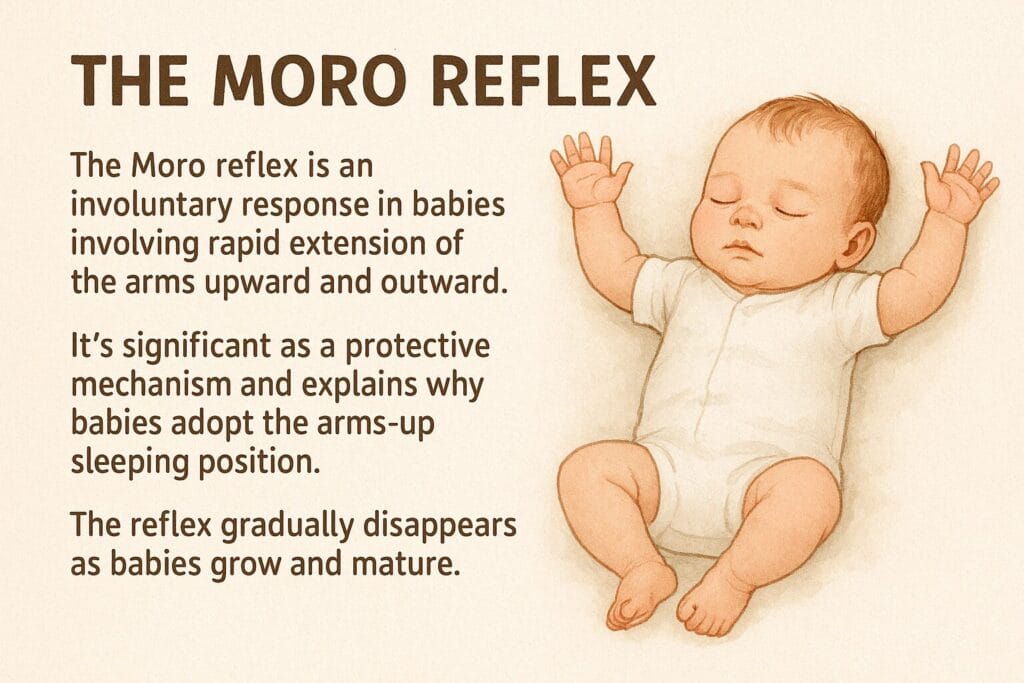
A common question many parents have is, why do babies sleep with their arms up? One of the primary reasons for this behavior is the Moro reflex, also known as the startle reflex. This reflex is a natural, involuntary response that babies have at birth and it plays a crucial role in their early development.
The Moro Reflex: A Natural Reflex in Newborns
The Moro reflex is a primitive reflex present at birth, and it usually disappears by the time the baby reaches 4 to 6 months of age. When a baby experiences a sudden change in their environment, such as a loud noise or a quick movement, their arms automatically shoot out to the sides and then return to the body. This reflex is a response to the feeling of being startled or threatened.
So, why do babies sleep with their arms up? When babies are still adjusting to life outside the womb, their nervous system is still developing. The Moro reflex causes their arms to extend outward, and sometimes, during sleep, this reflex can cause babies to sleep with their arms raised. This is completely normal and part of their natural development.
Why Do Babies Sleep With Their Arms Up? A Sign of Development
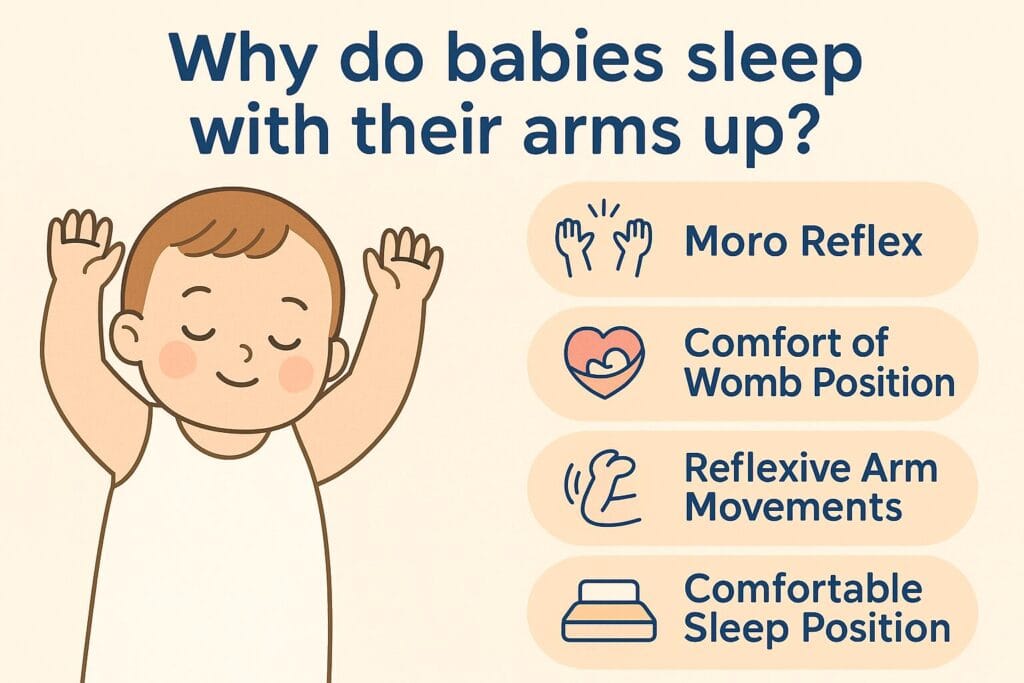
Understanding why babies sleep with their arms up can offer reassurance to parents. The Moro reflex is an instinctive reaction that babies have to potential disturbances, such as sudden noises or movement. When this reflex is active, it can lead to babies raising their arms involuntarily, which is why they might adopt this position during sleep. As babies grow and their nervous system matures, this reflex will gradually fade, and they will begin to adopt more stable sleeping positions.
The Moro Reflex and Sleep Disturbances
It’s important to note that while the Moro reflex is a natural part of your baby’s development, it can sometimes cause sleep disturbances. When babies are startled by this reflex, they may wake up suddenly and raise their arms. This can make them appear fussy or unsettled during sleep. However, it’s just part of the process, and why babies sleep with their arms up can often be explained by this reflex.
In conclusion, why do babies sleep with their arms up can be attributed to the Moro reflex, a normal and temporary reflex that is part of your baby’s growth. While this reflex can cause babies to adopt an arms-up sleeping position, it is a natural response as their body adjusts to life outside the womb. Understanding the Moro reflex can provide comfort, knowing that this behavior is simply part of your baby’s development and will fade as they grow older.
Looking for tips on how to create the perfect sleep environment for your baby? Check out our full guide on the ideal baby sleep temperature in the Baby Sleep Temperature Chart: The Ultimate Guide for Safe and Comfortable Sleep.
2. Why Do Babies Sleep With Their Arms Up? The Comfort of the Womb Position
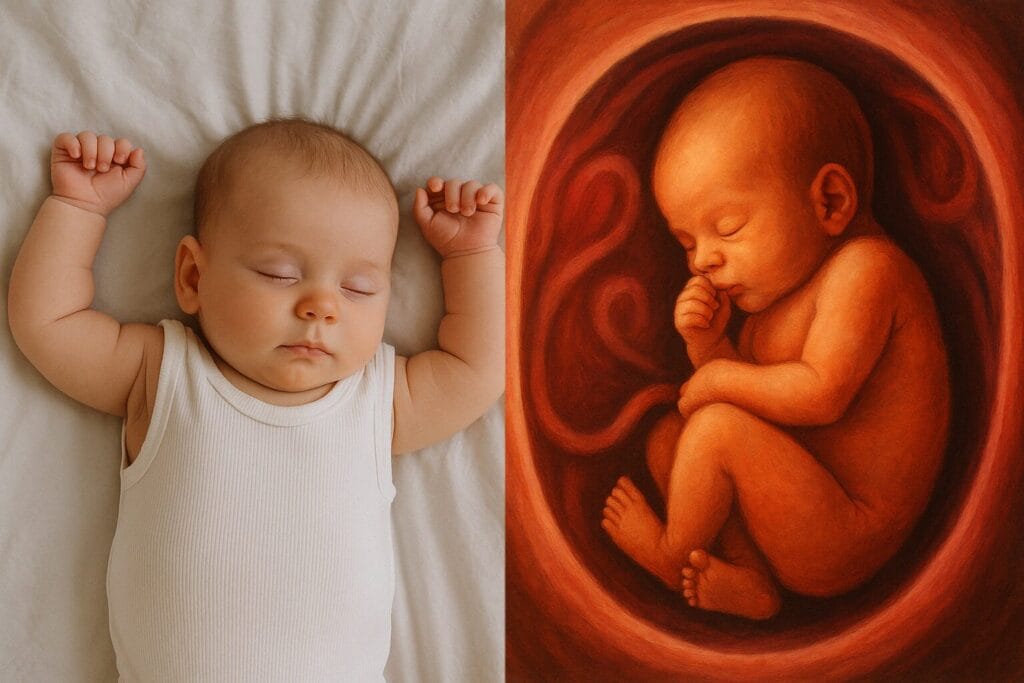
One of the key reasons why babies sleep with their arms up has to do with the comfort and familiarity they associate with this position. In the womb, babies were curled up in a confined space, often in a fetal position, with their arms bent or raised slightly. This position provided them with a sense of security and comfort, and it’s no surprise that babies may seek to recreate this familiar feeling after birth.
Recreating the Familiar Womb Environment: Why Do Babies Sleep With Their Arms Up?
After birth, babies are adjusting to a new world, and they often look for ways to replicate the snug and secure environment they had in the womb. Why do babies sleep with their arms up? This position helps them feel more at ease, as the feeling of their arms raised reminds them of the fetal position they were in before birth. It offers a sense of protection, which can be incredibly comforting for babies who are still navigating life outside the womb.
Natural Comfort: Why Do Babies Sleep With Their Arms Up?
The early months of a baby’s life come with limited movement, so sleeping with their arms raised may feel like a natural extension of the fetal position. As babies’ arms were often raised or bent while in utero, it makes sense that they would gravitate toward this position once born. This behavior is perfectly normal and not something to worry about. Why do babies sleep with their arms up? It’s simply a comfort-seeking behavior as they adjust to their new environment.
The Comfort of Familiarity: A Sense of Safety in the Arms-Up Position
The act of raising their arms while sleeping helps babies recreate the sense of safety and comfort they experienced in the womb. Why do babies sleep with their arms up? Because it helps them feel secure in their early stages of life. This familiar position reassures babies, offering them comfort during their transition to the outside world.
In conclusion, why do babies sleep with their arms up is a question rooted in their need for comfort and security. The familiar womb position provides them with a sense of safety and helps them feel more relaxed. As babies adjust to their new surroundings, they often adopt this position as a natural way to recreate the snugness they felt in utero. This behavior is completely normal and should not cause concern.
3. Reflexive Arm Movements During Sleep
In the first few months of life, babies experience involuntary movements that are driven by reflexes rather than conscious intention. When babies sleep, their bodies are still learning how to regulate movements, and as a result, it’s not uncommon for their arms to occasionally extend or raise in response to reflexive activity. These movements can happen even while they are sound asleep, and this is one reason why you might notice your baby sleeping with their arms up.
The reason for these reflexive movements has to do with the neurological development that occurs in the early stages of life. Babies’ brains are still wiring, and these involuntary movements are a way for their nervous system to develop strength and coordination. Over time, as babies grow and gain better muscle control, these reflexive movements will become more purposeful.
During sleep, babies may exhibit various reflexive behaviors like jerking or reaching out with their arms, which is why sleeping with their arms up can be a natural occurrence. These actions are simply part of their early development, helping them gain control over their body and movements as they grow older.
4. The Role of Comfort and Sleep Positions: Why Do Babies Sleep With Their Arms Up?
In addition to biological reflexes, the position that babies sleep in plays a significant role in how their bodies are positioned during rest. Babies are constantly exploring and experimenting with different sleeping positions, and as they rest, they may find certain positions more comfortable than others. Why do babies sleep with their arms up? For many, it’s simply a natural response to comfort. Some babies might instinctively lift their arms up when lying on their back or while resting.
Swaddling and Growth: Why Do Babies Sleep With Their Arms Up?
Parents often notice that babies may sleep with their arms raised after being swaddled. Swaddling is a technique that helps babies feel secure by mimicking the tight environment of the womb. However, as babies grow, they might begin to outgrow the swaddle and stretch out their limbs. Why do babies sleep with their arms up after being swaddled? The answer lies in their growing desire for freedom and comfort. When babies begin to move more freely, raising their arms can make them feel less confined and more relaxed, as it mirrors the open space they crave.
Sleep Environment and Comfort: Why Do Babies Sleep With Their Arms Up?
The sleep environment also plays a significant role in whether babies sleep with their arms raised. If a baby feels comfortable and warm, they might naturally adopt an arm-raised position. The firmness of the mattress, room temperature, and overall atmosphere contribute to how babies feel during sleep. Why do babies sleep with their arms up in these comfortable settings? Because the arms-up position can help them feel more at ease and less restricted, promoting relaxation and restful sleep.
Worried about your baby overheating during sleep? Learn how to recognize the signs and ensure safe sleep in our detailed guide: Signs Baby is Too Hot While Sleeping: A Comprehensive Guide to Safe Sleep Practices.
5. Understanding Infant Sleep Cycles
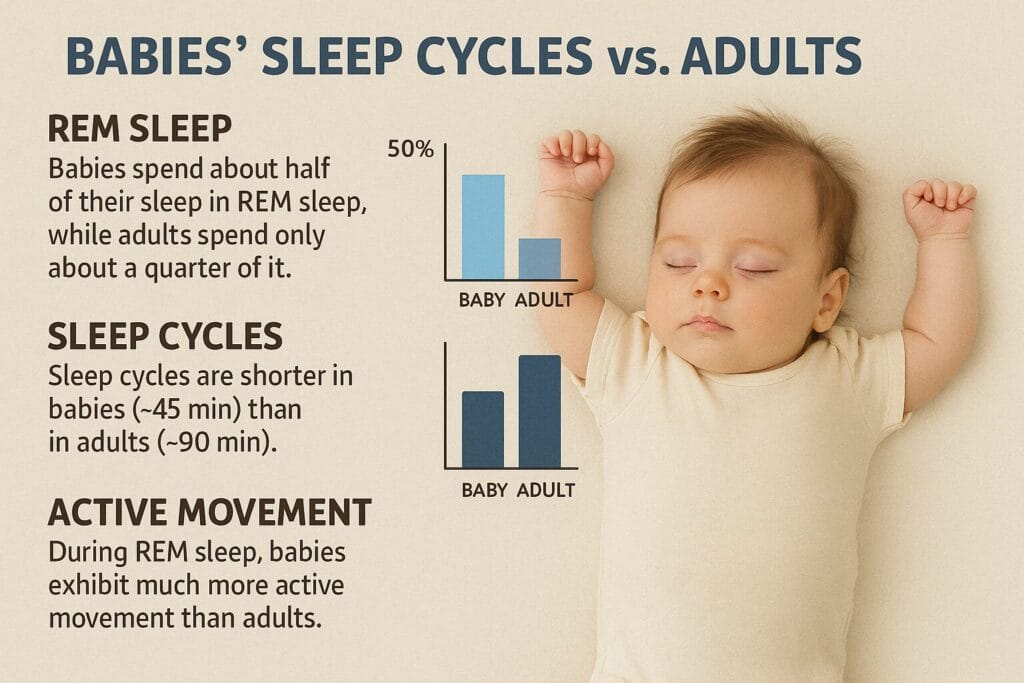
Babies’ sleep cycles differ from those of adults, and understanding how these cycles work can help explain why babies sleep with their arms up. In the early months of life, babies spend a significant amount of time in rapid eye movement (REM) sleep, which is the stage of sleep where most dreaming and active movement occur. During REM sleep, babies are more likely to exhibit jerky movements, which can include raising their arms.
As babies transition between sleep cycles, they may also engage in random movements, including raising their arms, as their bodies adjust to different stages of sleep. These movements are not consciously controlled by the baby, and instead, they are a reflection of the ongoing development of their nervous system.
Furthermore, babies who are going through periods of growth or experiencing more active brain development may have more frequent sleep cycles and, as a result, more frequent moments where their arms are raised. It’s a natural part of their biological rhythm and is not a cause for concern.
6. The Connection to Baby’s Developing Motor Skills
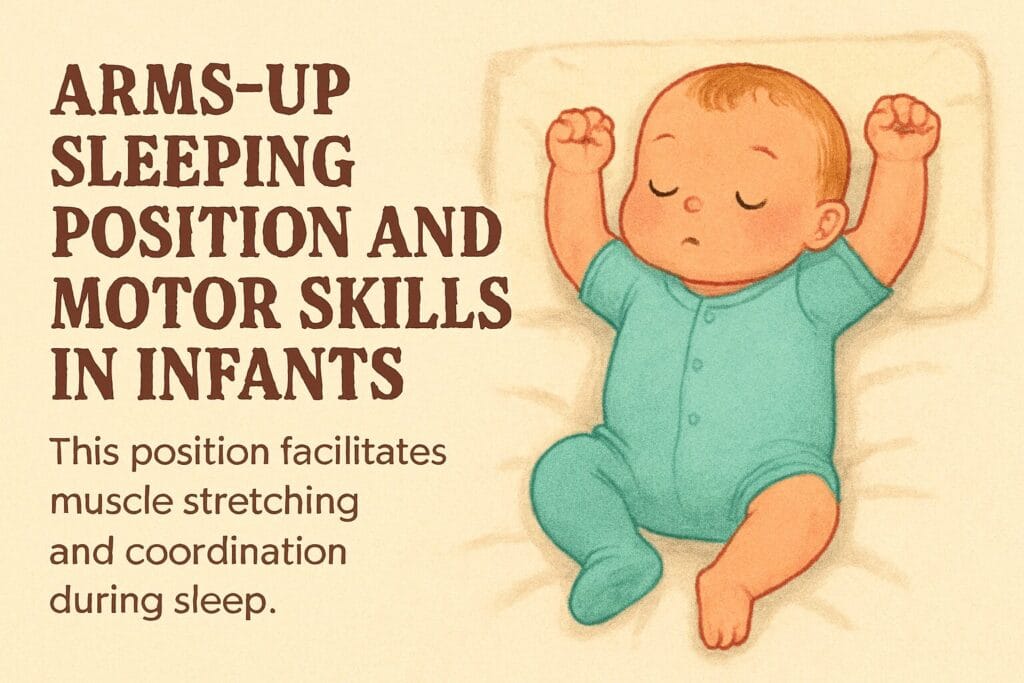
As babies grow, they become more aware of their bodies and develop the ability to make intentional movements. Motor skills are an essential part of early childhood development, and babies gradually gain control over their muscles and reflexes. This includes the ability to raise their arms on purpose.
Initially, these movements are reflexive, but over time, as the baby’s motor control improves, they may begin to raise their arms consciously, even during sleep. This may be part of their exploration of different body movements and a way to stretch and practice new motor skills. In the process of developing motor skills, babies may frequently sleep with their arms up as they experiment with body movements and stretch their muscles.
It’s essential to understand that this behavior is part of a healthy developmental process. If your baby sleeps with their arms up, it’s likely a natural part of their growing ability to control their movements and gain muscle strength.
7. Why Do Babies Sleep With Their Arms Up? Is It Safe?
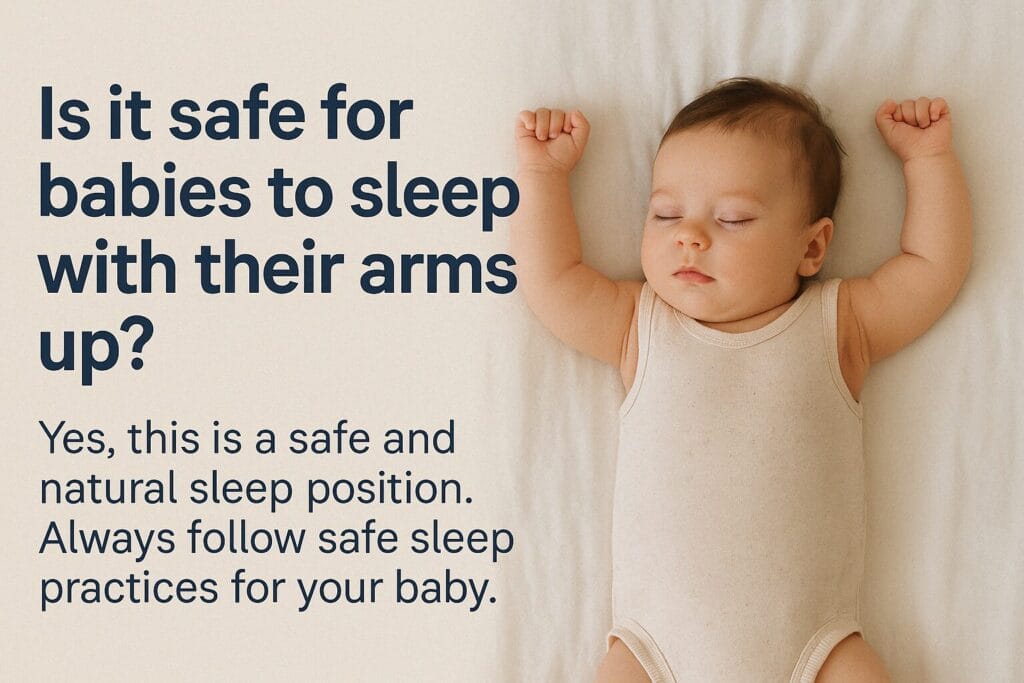
Many parents wonder why do babies sleep with their arms up and whether it is safe for them to do so. The good news is that, for most babies, sleeping with their arms raised is completely natural and safe. Babies are born with a high degree of flexibility, and their bodies are designed to move in various ways during sleep. This sleeping position is often just one of the many ways your baby can be comfortable.
The Safety of Sleeping with Arms Up
One of the most important things to remember when your baby is sleeping is that they should always be placed on their back to sleep, which is the recommended position for reducing the risk of sudden infant death syndrome (SIDS). As long as your baby is placed on their back and remains in that position, it is completely fine for them to sleep with their arms up.
Why do babies sleep with their arms up in the first place? Babies often raise their arms during sleep because it mimics the position they were in while in the womb, where their arms were frequently in a bent or upward position. This is a reflexive motion and helps babies feel more secure.
When to Be Concerned About Sleeping with Arms Up
In most cases, there is no need to worry about your baby sleeping with their arms up. However, if you notice any signs of discomfort or difficulty breathing while your baby is in this position, it’s important to check with your pediatrician. While babies generally find comfortable sleeping positions as they grow, it’s always best to consult with a healthcare professional if you have any concerns.
Why Do Babies Sleep with Their Arms Up? A Natural Reflex
Why do babies sleep with their arms up? This position is actually a natural reflex. When babies are born, they still retain many of the reflexes they had while in the womb, and one of those is the Moro reflex (also known as the startle reflex). This reflex causes babies to throw their arms up or outward when they are startled or moved, which can sometimes lead to them sleeping with their arms up.
This reflex is typically temporary and fades as the baby matures, so there is no need to worry if your baby sleeps with their arms up. As babies grow and their muscles and coordination improve, they will likely sleep in various positions, and the arms-up position may become less frequent.
Conclusion: Embracing the Adorable Behavior
Now that you have a deeper understanding of why babies sleep with their arms up, you can rest easy knowing that this behavior is entirely natural. Whether it’s due to the Moro reflex, the comfort of the fetal position, or the development of motor skills, this adorable habit is just one of the many ways that your baby is growing and adjusting to life outside the womb.
As your baby continues to develop, they will explore various sleep positions and reflexes. The arms-up sleeping position is simply a phase that is part of their ongoing growth. Rest assured, this behavior is a sign of your baby’s evolving motor skills and the gradual progression towards better muscle control.
Ultimately, if your baby enjoys sleeping with their arms up, embrace this endearing moment. It’s just another example of how fascinating and unique the early stages of life can be.
Many parents notice their baby sleeping with arms raised and wonder if it’s normal. This common sleep position is often linked to the Moro Reflex, a natural response in newborns that causes sudden movements. When babies sleep with their arms up, it usually indicates comfort and relaxation. Some even rest with open hands, further showing their sense of ease.
This arms-up position is a natural extension of how babies move in the womb. While many parents choose to swaddle their infants, some prefer having their hands free. Allowing a baby to sleep in their natural posture helps promote healthy sleep habits and a sense of security.
Interestingly, even adults sometimes sleep with their arms up when they feel completely at ease. For newborns, this posture often signals deep relaxation and a smooth adjustment to their surroundings. If your baby sleeps with arms raised, it’s usually a sign that they feel safe and comfortable during rest.
Swaddling vs. Arms-Free Sleeping
You’ve probably heard a lot about swaddling—tightly wrapping your baby in a blanket to mimic the snugness of the womb. Swaddling is often recommended, especially for fussy newborns, as it can soothe them and reduce the startle reflex.
But what if your baby doesn’t seem to love being swaddled? Some infants prefer the freedom to move their arms and sleep with them raised.
For babies who reject traditional swaddling, products like the Love to Dream Swaddle Up have gained popularity. These innovative sleep sacks are specifically designed for babies who like to sleep with their arms up while still providing the snug feeling of being swaddled.
Remember, every baby is different. Whether your little one prefers the coziness of swaddling or the freedom of arms-up sleeping, listen to their cues and choose the approach that makes them feel most comfortable.
Safe Sleep Practices for Babies
Regardless of whether your baby sleeps with their arms up, down, or somewhere in between, the most important priority is always safety. Following these safe sleep guidelines can create a protective environment for your baby during naps and nighttime sleep.
- Back to Sleep: Always place your baby on their back to sleep. This is the safest position to reduce the risk of SIDS.
- Firm Mattress: Use a firm and flat sleep surface, such as a crib mattress, covered with a fitted sheet.
- Avoid Loose Items: Keep the crib free from blankets, pillows, stuffed animals, and other potential hazards.
- Room Sharing: Experts recommend keeping your baby’s crib in your room for the first six months, but avoid bed-sharing.
- Temperature Regulation: Make sure the room is at a comfortable temperature, and dress your baby in breathable sleepwear to prevent overheating.
Tips for Encouraging Healthy Sleep Habits
Getting your baby to sleep well can feel like a monumental task, but a few simple strategies can go a long way in promoting restorative rest:
- Establish a bedtime routine, including soothing activities like singing or rocking.
- Ensure your baby has ample opportunities for tummy time during the day to strengthen their muscles and encourage physical development.
- Observe your baby’s sleep cues (like yawning or rubbing their eyes) to identify their natural sleep-wake cycles.
Expert Opinions on Infant Sleep Positions
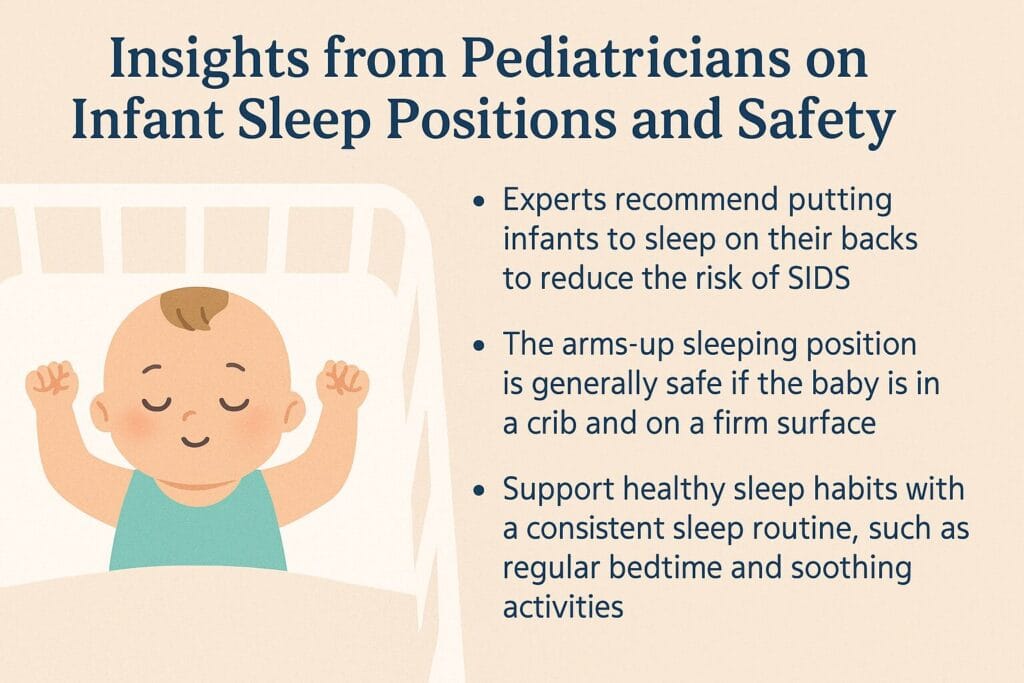
Pediatricians and sleep experts widely agree that while the arms-up position may seem unique at first, it’s entirely normal and doesn’t require any intervention. Swaddling, arms-free sleeping, and other choices are personal decisions based on your baby’s comfort and preferences.
Dr. Rachel Moon, chair of the AAP Task Force on SIDS, emphasizes that “the most critical aspect is creating a safe sleep environment, not the specific position of their arms or legs during sleep.”
Have you noticed your baby sleeping in this adorable position? Share your thoughts or experiences in the comments below—we’d love to hear from you!
FAQs
1. Is it normal for babies to sleep with their arms up?
Yes, it is completely normal for babies to sleep with their arms up. This position often indicates that they feel safe, relaxed, and comfortable. It’s a natural part of their development.
2. Should I adjust my baby’s sleeping position if their arms are raised?
No, there’s no need to adjust their position. If your baby is sleeping soundly and breathing comfortably, it’s best to let them stay in their preferred position.
3. What does the arms-up position signify?
The arms-up sleeping position typically signifies that the baby is in a deep, peaceful sleep and feels at ease in their surroundings.
4. Does the arms-up sleeping position mean my baby is too cold or too warm?
Not necessarily. However, you should always check your baby’s sleeping environment and clothing to ensure they are dressed appropriately for the room’s temperature. Keeping them comfortable is key.
5. Can adults also benefit from sleeping with arms up?
While less common for adults, this position can indicate a state of comfort and relaxation. If you find yourself in this position, it may simply mean you’re resting well.
6.When does the Moro reflex disappear?
The Moro reflex typically disappears around 3 to 4 months of age as babies gain more control over their movements and develop better motor skills.
7.Can babies sleep safely with their arms up?
As long as your baby is sleeping on their back in a safe sleep environment (flat surface, no loose bedding), sleeping with their arms up is safe.
8.Should I be concerned if my baby sleeps with their arms up?
No, it’s a common and natural behavior. If you notice other signs of discomfort or developmental concerns, it’s always a good idea to consult your pediatrician.
9.How can I help my baby sleep more soundly?
Ensuring a consistent sleep routine, a comfortable sleep environment, and safe sleep practices can help your baby sleep more peacefully.



